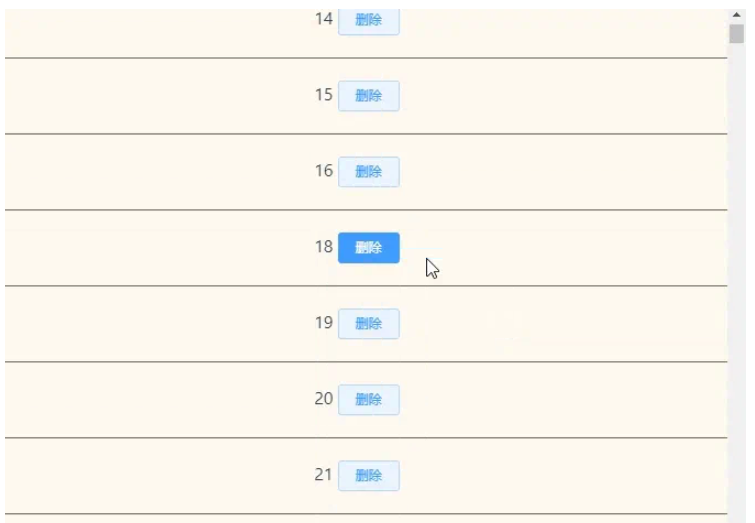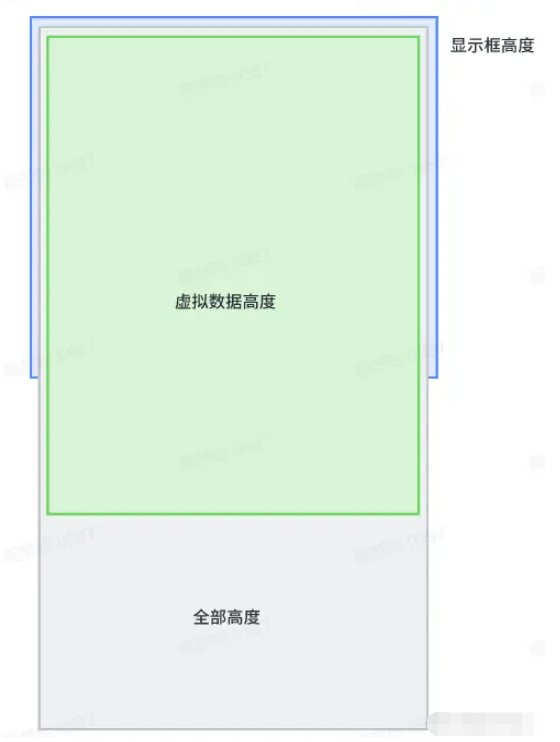您好,登錄后才能下訂單哦!
您好,登錄后才能下訂單哦!
今天小編給大家分享一下基于Vue如何封裝一個虛擬列表組件的相關知識點,內容詳細,邏輯清晰,相信大部分人都還太了解這方面的知識,所以分享這篇文章給大家參考一下,希望大家閱讀完這篇文章后有所收獲,下面我們一起來了解一下吧。

使用方法
<template>
<div>
<div class="virtual-list-md-wrap">
<hub-virtual-list :allData="data" itemHeight="70" :virtualData.sync="virtualData">
<div v-for="(item, index) in virtualData" class="item">
{{ item }}
<el-button type="primary" size="mini" plain @click="deleteItem(item)">刪除</el-button>
</div>
</hub-virtual-list>
</div>
</div>
</template>
<script>
export default {
data() {
return {
data: [],
virtualData: []
}
},
created() {
setTimeout(() => {
this.addData()
}, 1000)
},
watch: {
},
methods: {
addData() {
for(let i = 0; i <= 100000; i ++) {
this.$set(this.data, i, i)
}
},
deleteItem(index) {
this.data = this.data.filter((item) => item !== index)
}
}
}
</script>
<style>
.virtual-list-md-wrap {
height: 500px;
background-color: #FFFAF0;
}
.item {
border-bottom: 1px solid #666;
padding: 20px;
text-align: center;
}
</style>| 參數 | 說明 | 類型 | 可選值 | 默認值 |
|---|---|---|---|---|
| allData | 全部數據 | Array | - | [] |
| virtualData | 虛擬數據 | Array | - | [] |
| itemHeight | 每行的高度,用于計算滾動距離 | Number, String | - | 30 |
| 插槽名 | 說明 |
|---|---|
| - | 自定義默認內容,即主體區域 |
首先梳理我想要的組件效果:
滾動條正常顯示
加載渲染大量數據不卡頓
能對列表數據進行操作增刪等
需要把顯示框分為3部分:顯示高度,全部高度,虛擬數據高度
大概的比例是這樣的

為達到滾動條的效果,在最外層顯示高度設置overflow: auto可以把滾動條撐出來,全部高度則設置position: absolute;z-index: -1;height: auto;,虛擬數據高度則設置position: absolute; height: auto;
整體樣式代碼如下
<template>
<div class="hub-virtual-list">
<!-- 顯示高度 -->
<div ref="virtualList" class="hub-virtual-list-show-height" @scroll="scrollEvent($event)">
<!-- 全部高度,撐出滾動條 -->
<div class="hub-virtual-list-all-height" :/>
<!-- 存放顯示數據 -->
<div class="virtual-list" :/>
</div>
</div>
</template>
<style lang="scss" scoped>
.hub-virtual-list {
height: 100%;
&-show-height {
position: relative;
overflow: auto;
height: 100%;
-webkit-overflow-scrolling: touch;
}
&-all-height {
position: absolute;
left: 0;
top: 0;
right: 0;
z-index: -1;
height: auto;
}
.virtual-list {
position: absolute;
left: 0;
top: 0;
right: 0;
height: auto;
}
}
</style>如果想要渲染不卡頓,就得只加載顯示區域的虛擬數據,虛擬數據的更新邏輯為:用startIndex和endIndex標志虛擬數據的起始索引和結束索引,在滾動條滑動時,通過計算滑動的距離去更新startIndex和endIndex。另外用offset標記偏移量,對虛擬數據區域設置transform: translate3d(0, ${this.offset}px, 0)跟著滾動條去移動
核心部分代碼如下
scrollEvent(e) {
const scrollTop = this.$refs.virtualList.scrollTop
// 起始索引 = 滾動距離 / 每項高度
this.startIndex = Math.floor(scrollTop / this.itemHeight)
// 結束索引 = 開始索引 + 可見數量
this.endIndex = this.startIndex + this.visibleCount
// 偏移量 = 滾動距離
this.offset = scrollTop - (scrollTop % this.itemHeight)
}如果想要在數據里添加操作按鈕,則需要在封裝組件時設置插槽,且需要把虛擬數據同步給父組件
設置插槽
<!-- 顯示高度 --> <div ref="virtualList" class="hub-virtual-list-show-height" @scroll="scrollEvent($event)"> <!-- 全部高度,撐出滾動條 --> <div class="hub-virtual-list-all-height" :/> <!-- 存放顯示數據 --> <div class="virtual-list" :> <!-- 設置插槽 --> <slot/> </div> </div>
滾動時把虛擬數據同步給父組件
scrollEvent(e) {
const scrollTop = this.$refs.virtualList.scrollTop
// 起始索引 = 滾動距離 / 每項高度
this.startIndex = Math.floor(scrollTop / this.itemHeight)
// 結束索引 = 開始索引 + 可見數量
this.endIndex = this.startIndex + this.visibleCount
// 偏移量 = 滾動距離
this.offset = scrollTop - (scrollTop % this.itemHeight)
// 同步父組件數據
this.inVirtualData = this.allData.slice(this.startIndex, this.endIndex)
this.$emit('update:virtualData', this.inVirtualData)
}<template>
<div class="hub-virtual-list">
<!-- 顯示高度 -->
<div ref="virtualList" class="hub-virtual-list-show-height" @scroll="scrollEvent($event)">
<!-- 全部高度,撐出滾動條 -->
<div class="hub-virtual-list-all-height" :/>
<!-- 存放顯示數據 -->
<div class="virtual-list" >
<slot/>
</div>
</div>
</div>
</template>
<script>
export default {
name: 'hub-virtual-list',
props: {
// 全部數據
allData: {
type: Array,
default: () => []
},
// 虛擬數據
virtualData: {
type: Array,
default: () => []
},
// 每項高度
itemHeight: {
type: [Number, String],
default: '30'
},
// 每項樣式
itemStyle: {
type: Object,
default: () => {}
}
},
data() {
return {
// 起始索引
startIndex: 0,
// 結束索引
endIndex: null,
// 偏移量,計算滾動條
offset: 0,
inVirtualData: []
}
},
computed: {
// 所有高度
allHeight() {
// 每項高度 * 項數
return this.itemHeight * this.allData.length
},
// 可見數量
visibleCount() {
// 可見高度 / 每項高度
return Math.ceil(this.showHeight / this.itemHeight)
},
// 顯示數據的偏移量
getTransform() {
return `translate3d(0, ${this.offset}px, 0)`
}
},
watch: {
allData: {
handler() {
this.inVirtualData = this.allData.slice(this.startIndex, this.endIndex)
this.$emit('update:virtualData', this.inVirtualData)
},
deep: true
}
},
mounted() {
this.showHeight = this.$el.clientHeight
this.startIndex = 0
this.endIndex = this.startIndex + this.visibleCount
},
methods: {
scrollEvent(e) {
const scrollTop = this.$refs.virtualList.scrollTop
// 起始索引 = 滾動距離 / 每項高度
this.startIndex = Math.floor(scrollTop / this.itemHeight)
// 結束索引 = 開始索引 + 可見數量
this.endIndex = this.startIndex + this.visibleCount
// 偏移量 = 滾動距離
this.offset = scrollTop - (scrollTop % this.itemHeight)
// 同步父組件數據
this.inVirtualData = this.allData.slice(this.startIndex, this.endIndex)
this.$emit('update:virtualData', this.inVirtualData)
}
}
}
</script>
<style lang="scss" scoped>
.hub-virtual-list {
height: 100%;
&-show-height {
position: relative;
overflow: auto;
height: 100%;
-webkit-overflow-scrolling: touch;
}
&-all-height {
position: absolute;
left: 0;
top: 0;
right: 0;
z-index: -1;
height: auto;
}
.virtual-list {
position: absolute;
left: 0;
top: 0;
right: 0;
height: auto;
}
}
</style>以上就是“基于Vue如何封裝一個虛擬列表組件”這篇文章的所有內容,感謝各位的閱讀!相信大家閱讀完這篇文章都有很大的收獲,小編每天都會為大家更新不同的知識,如果還想學習更多的知識,請關注億速云行業資訊頻道。
免責聲明:本站發布的內容(圖片、視頻和文字)以原創、轉載和分享為主,文章觀點不代表本網站立場,如果涉及侵權請聯系站長郵箱:is@yisu.com進行舉報,并提供相關證據,一經查實,將立刻刪除涉嫌侵權內容。